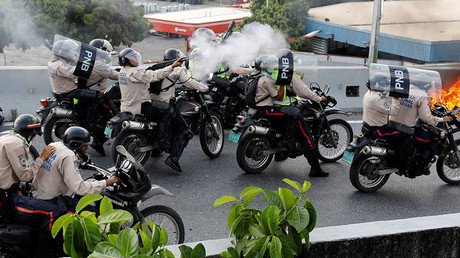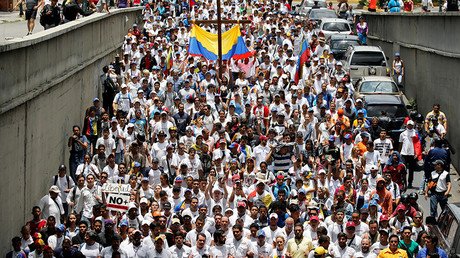Opposition calls on Venezuelans to revolt as Maduro calls vote for a new ‘constituent’ assembly
Venezuela’s embattled president, Nicolas Maduro, said he is convening the Constituent Assembly in a bid to fight a “fascist” takeover. The opposition called the move a “coup” and a “scam,” calling on supporters to take to the streets.
In an attempt to find a way out of the political turmoil which Venezuela has found itself in since last month, Maduro announced he was invoking provisions of the Venezuelan Constitution, which, he argued, enable him to call a vote for a new constituent assembly.
Justifying the decision, which critics argue may further delay a general election – the key demand of the opposition – Maduro said that a 500-member body, to be comprised largely of ordinary people, will guide Venezuela out of its state of intransigence and put an end to the ongoing violence.
“I convoke the original constituent power to achieve the peace needed by the Republic, defeat the fascist coup, and let the sovereign people impose peace, harmony and true national dialogue,” Maduro said on Monday in a televised address on International Workers’ Day.
“I don’t want a civil war,” he said.
However, Maduro’s attempt to shift the responsibility for the country’s future onto the will of “the people, the communities, the peasants,” who will be entrusted with rewriting the constitution, did not sit well with the opposition, which have been demanding early elections.
READ MORE: 3 killed as Venezuelans hit streets in massive anti-Maduro protest (PHOTOS, VIDEOS)
While it is yet to be seen who will sit on the constituent assembly, opponents of the government argue that if the convocation decree signed by Maduro on Monday is brought into effect, Maduro will seek to fill it with his supporters.
“This is a scam to deceive the Venezuelan people with a mechanism that is nothing more than a coup,” National Assembly President Julio Borges said, as cited by Reuters.
The leader of the protest movement, former presidential candidate Henrique Capriles, linked Maduro’s decision to his unwillingness to hold democratic elections, calling to outright “disobey the convocation of a fraudulent constituent assembly.”
Labelling Maduro a “dictator” on Twitter, Capriles urged people to take to the streets to “disobey such a madness.”
Frente al fraude constitucional de constituyente que acaba de anunciar el dictador,Pueblo a la calle y a desobedecer semejante locura!
— Henrique Capriles R. (@hcapriles) 1 мая 2017 г.
“We, the Venezuelans, will not accept the continuation of Maduro’s autocoup… Dictator Maduro and his drug corrupted leadership want to kill the constitution of the Bolivarian Republic of Venezuela! They will not be able to do that!” he wrote.
Meanwhile, anti-government protests continue across the country, with 37 people injured on the day of the announcement alone, according to Caracas’ Chacao Municipality mayor, Ramon Muchacho. The victims suffered from tear gas inhalation, pellet wounds, and fainting.
On Sunday, a vigil took place in Caracas to commemorate all those killed in the violent clashes that claimed at least 29 lives. Overall, over 400 people have received injures since the beginning of the protests in April. Hundreds have been arrested.
1M 5:40pm Balance de atenciones @SaludChacao a esta hora. pic.twitter.com/B3hdjfpZaF
— RAMÓN MUCHACHO (@ramonmuchacho) 1 мая 2017 г.
Accusations against Maduro of undermining the constitutional basis of the country have grown as protests grip the country. As a result of a ruling in March – hailed by Maduro as “historic” and decried by the opposition as “a coup d’état” – the Supreme Court, which is loyal to the president, assumed the duties of the National Assembly.
“In Venezuela, we have a government operating outside the constitution. There’s now a dictatorship in Venezuela. They have crossed the line,” Capriles said at the time.
While the controversial ruling was repealed three days later, it appears to have done irreparable damage, with protests continuing.
Speaking about the main challenges that Venezuela faces, Maduro appeared on Sunday to brush off criticism for not calling snap elections despite persistent calls from the opposition, citing the economic slump and political crisis which has reaching the boiling point.
“Venezuela’s problem is not that there won’t be elections this year. Venezuela’s problem is that an empire in extremists’ hands wants to take our oil and carry out a coup,” Maduro said.














